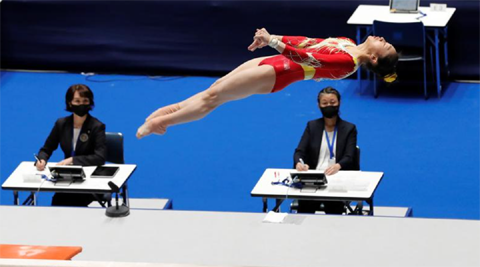
Socially-distanced fans, no shouting from the stands, a PCR test every morning and staying inside the bio-secure bubble: Japan, on Sunday, provided a glimpse into what next year’s Tokyo Olympics may look like if a vaccine isn’t available by the time the Games are opened on July 23.
The country hosted an invitational four-nation gymnastics test event, which was attended by 2,000 fans. It was the first international tournament to be held in Japan since the Games’ postponement in March due to the Covid-19 pandemic.
Organisers said the one-off friendly event was a ‘crucial trial run’ to show that the Games, which will bring some 11,000 athletes to Tokyo, can go ahead as planned.
Japan invited 32 gymnasts, eight each from four countries. Besides the hosts, gymnasts from the USA, Russia and China participated. Each country were allowed to send up to eight athletes but the USA sent a smaller team as only six were confident of making the trip, Japanese daily Asahi Shimbun reported.
The gymnasts were divided into two teams – Solidarity and Friendship – regardless of their nationality or gender. There were no individual or all-around winners, with the top-three scores on each apparatus per team counting towards the final team score.
The event was headlined by Japanese star Kohei Uchimura, the two-time Olympic all-around champion. Reigning world champion Nikita Nagornyy and 2019 World Championship bronze medalist Angelina Melnikova, both from Russia, were also there along with Chinese sensations Ma Yue and Yin Dehang, and American World Championship medalist Yul Moldauer.
As an exception to the country’s pandemic regulations, the Japanese government exempted the travelling contingents from the otherwise mandatory 14-day quarantine. But the other rules were strict.
The gymnasts had to take a Polymerase Chain Reaction (PCR) test within 72 hours before their departure for Japan. They travelled by chartered planes and upon their arrival at the airport, they were separated from other passengers. The gymnasts and other officials were directly escorted to the hotel, where each nation had reserved its own floor that was monitored by security guards.
The countries were given separate buses, which were disinfected each night, to move between the hotel, training base and competition venue. Shopping requests, if any, were to be handed to the hotel staff, Asahi said.
Every morning, each person related to the event had to undergo a PCR test. After arriving at the venue, they had to get their temperature checked and use sanitizers regularly. In fact, everyone entering the venue, including the 2,000 spectators, was sprayed with a disinfectant mist.
On the competition floor, the gymnasts did not share powder chalk.
According to AFP, the spectators had to wear face masks on Sunday. “They sanitised their hands regularly, checked their body temperature and remained socially distanced at the 8,700-capacity Yoyogi No.1 Gymnasium, while being encouraged not to shout support to avoid spreading droplets,” the agency added.

